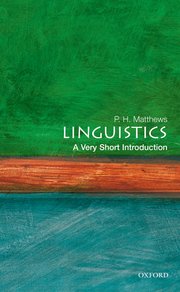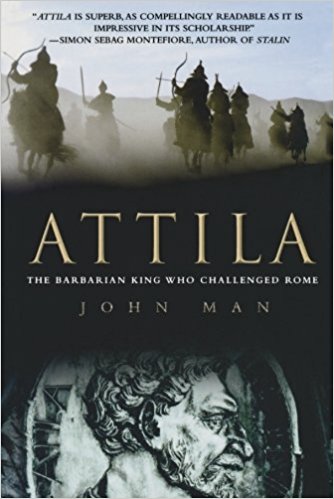|
Linguistics: A Very Short Introduction
by P.H. Matthews Published in June 2003 132 Pages Thibault’s Score: 3/5 I’ve been reading about linguistics because I’m in the process of re-learning Chinese. This book wasn’t detailed or technical enough, and I don’t really feel like I have learned that much. Most of what the authors write about was very intuitive and I already knew. “Languages are very different, and can’t be directly translated.” “Languages evolved from one another like species.” These are insights that only people who are monolingual need - anyone who is trilingual and has any knowledge of history whatsoever already knows this. The book was simple and well written, and I imagine it might be useful for schoolchildren maybe in the 6th or 7th grade - especially if they only know one language and are about to learn another. Overall I don’t recommend this book as an introduction into linguistics, although it wasn’t by any means a bad read.
1 Comment
Attila: The Barbarian King Who Challenged Rome
by John Man 336 Pages Published in 2009 Thibault’s Score: 4/5 John Man traces the history of the Huns from their potential Xiongnu origins until their integration into modern European States like Hungary, and does a great job at highlighting the life and genocides of Attila. There are numerous very interesting tidbits scattered throughout this book. For example, I had never given mounted archery much of a thought. The section of the book where John Man describes the difficulties and intense training involved really shocked and fascinated me. I also thought that the sections about Attila’s early campaigns against the Persians and the Eastern Empire fascinated me. I enjoyed reading about the Eastern Empire’s embassy to Attila which is rife with plots and intrigue. My only criticism is that, at certain points, the author grasps at historical straws and attempts to portray them as a lot more than they really are. For example, a body was found in France which he attributes (without much evidence) to the king of the Goths. The part that stuck with me the most was the description of how Attila drank himself to death and choked on his own blood. A worthy death for a tyrant who spilled the blood of thousands of innocents. Overall, I found this to be a decent read, especially for people who are very interested in late Roman history and for people who want to get a better understanding of the transition from Empire to Feudalism. The Decline and Fall of the Roman Empire (Volumes 1 - 6)
by Edward Gibbon Published from 1776 (Volume 1) to 1789 (Volume 6) 10,500 pages Thibault’s Score: 5/5 Holy fucking shit. This is by far the longest and most difficult book I have ever tackled. The audiobook was 240 hours long. I started November 11 2017 and finished on January 17 2018. I listened to the audiobook and occasionally followed up with a PDF version. Over the last year, I’ve read very extensively about Greeko-Roman history, as this blog will attest. Nearly every book that I’ve read in the field at least references Edward Gibbon. After doing some Googling, I found out that he was the premier historian in the field, so I had to read him. Gibbon is a very interesting guy. He is the first historian to cite all facts, and nearly all of his citations come from primary sources. As a young man, he was weak and sickly, so he turned to literature and to history. He also became a freemason, and felt like he needed to give the British elite the real history of the Roman Empire, unadulterated by the political machinations of organizations like the Vatican. His books were banned in numerous countries due to his criticisms of Christianity and his focus on secret societies within the Roman Empire such as the Praetorian guard. He begins his history with Augustus’ ascension as emperor and ends his history with the fall of Constantinople in 1453 - his work is a history of the Roman Empire, broadly conceived as including the Byzantine Empire, the Holy Roman Empire, the Ottomans, and other peoples who assumed the mantle of the Roman Emperors, even if they had little to do with the Empire of Trajan and Augustus. Only a small portion of the book (volumes one and two) cover the history of the “original” Roman Empire. This was one of the most intense, educational, and interesting literary journeys that I have ever embarked on, and I feel a lot more knowledgable about the eras in question now. I enjoyed the writing style of the book - it is sarcastic, and at times, humorous. When I first began reading Gibbon, I didn’t enjoy the writing, however as time passed, it grew on me. He uses a lot of words like “rapine” and “licentiousness,” and many of his sentences are formatted with an “or split.” IE “they opened the gates out of piousness, or fear.” and “the Romans intelligently, or cowardly, decided to retreat.” His use of “or split” sentences helps the reader understand the different ways that historians have interpreted the same events. There are several highlights which really stood out during my reading of The Decline and Fall of the Roman Empire. From emperors Augustus until Constantine, the Praetorian guard played an important role in Imperial politics. The Praetorian guard was started as a corps of bodyguards to protect the emperors and high ranking senators. Eventually, they morphed into a spy agency and intelligence service, and began deposing and choosing emperors. They would kill all of the really bad emperors and all of the really good ones as well, preserving the status quo. In one case, they even climbed on the palace walls and auctioned off the purple. Gibbon also criticizes Christianity as one of the forces that precipitated the decline and destruction of the Roman Empire. For example, iconoclasts believed that the worship of idols was sinful, so proceeded to systematically destroy all art and literature. Christians also opted to let Goths, Vandals, and other barbarians freely settle the empire because they were “fellow Christians.” Later, he criticizes the Vatican as an institution of hypocrisy and greed. I also enjoyed reading about the People’s Crusade and the reign of Byzantine Emperor Alex Komnemos in the late 11th century. One of the most interesting incidents of his reign I had only heard of but hadn’t really payed attention to was the People’s Crusade. Peter the Hermit, a monk who was inspired by Pope Urban’s declaration of the first crusade, gathered an army of 60,000 village idiots who marched from France, Germany, and Italy to the Holy Land through Hungary. On their way, they massacred Jews, pillaged Christian towns, and attacked cities which they misidentified as Jerusalem. The way Alex Komnemos dealt with them was by ferrying them to Anatolia where they were slaughtered by the Turks almost instantly. Gibbon’s history is particularly interesting because it goes against the Whig historiography of the time when he was writing. Gibbon did not believe that history was an inevitable progression towards liberty and freedom, instead he rightly understood that progress and decline were constantly in competition. His history draws attention to the Roman deep state. He looks behind the throne rather than looking simply at the throne, and exposes the military, religious institutions, and nobility for who they really are. I recommend this book to serious students of history, but cannot recommend it to the general public. This book is very difficult, and is very challenging. It is nearly impossible to understand without both Wikipedia and a good grasp of both Roman and Byzantine history. It also is more than 10,000 pages and is far too long and detailed for most people. |
Thibault SerletMost of my articles are book reviews, but I also write about many other topics. Archives
December 2023
Categories |



 RSS Feed
RSS Feed